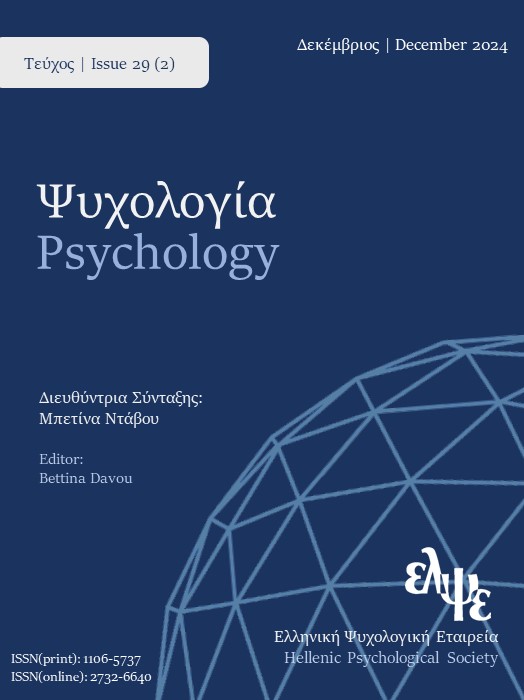Υπογονιμότητα: Εμπειρίες Ελληνίδων που υποβάλλονται σε εξωσωματική γονιμοποίηση

Περίληψη
Η παρούσα μελέτη στοχεύει να διερευνήσει τις εμπειρίες των Ελληνίδων κατά τη διαδικασία της εξωσωματικής γονιμοποίησης, στο στάδιο πριν από τη λήψη φαρμάκων, δηλαδή πριν από τη λήψη των ωαρίων και την εμβρυομεταφορά. Το δείγμα αποτελείται από οκτώ γυναίκες με ιστορικό υπογονιμότητας, με διάγνωση που τέθηκε τουλάχιστον έναν χρόνο πριν. Η μελέτη ήταν ποιοτική και η συλλογή των δεδομένων πραγματοποιήθηκε μέσω μιας ημι-δομημένης συνέντευξης πρόσωπο με πρόσωπο, ενώ υιοθετήθηκε μια φαινομενολογική προσέγγιση για την περιγραφή της εμπειρίας των γυναικών. Σύμφωνα με τα αποτελέσματα, αυτές οι γυναίκες φαίνεται να περνούν από διάφορα στάδια συναισθηματικής δυσφορίας και νιώθουν ότι δε λαμβάνουν επαρκή υποστήριξη από τις οικογένειές τους και το κοινωνικό τους περιβάλλον. Έχουν την ανάγκη τόσο ο κοινωνικός τους ιστός όσο και το ιατρικό προσωπικό να προσεγγίζουν το θέμα ολιστικά, συμπεριλαμβάνοντας την ψυχοκοινωνική διάσταση του θέματος. Προτείνεται οι μελλοντικές ερευνητικές προσπάθειες να λάβουν υπόψη το κοινωνικο-πολιτισμικό υπόβαθρο της εμπειρίας της υπογονιμότητας και να διερευνήσουν σε βάθος τις εμπειρίες των ζευγαριών που υποβάλλονται σε διαδικασίες εξωσωματικής γονιμοποίησης. Τέλος, προτείνεται οι διαδικασίες υποστήριξης γι’ αυτά τα ζευγάρια να περιλαμβάνουν ένα ευρύ φάσμα συμβουλευτικής για την οικογένεια και το ζευγάρι, με έμφαση σε στρατηγικές που διαχειρίζονται επιτυχώς τη στρεσογόνο κατάσταση και το κοινωνικό περιβάλλον.
Λεπτομέρειες άρθρου
- Πώς να δημιουργήσετε Αναφορές
-
Μπρουσκέλη Β., & Ανδρέου Ε. (2024). Υπογονιμότητα: Εμπειρίες Ελληνίδων που υποβάλλονται σε εξωσωματική γονιμοποίηση. Ψυχολογία: το περιοδικό της Ελληνικής Ψυχολογικής Εταιρείας, 29(1), 177–193. https://doi.org/10.12681/psy_hps.36372
- Ενότητα
- ΕΜΠΕΙΡΙΚΕΣ ΕΡΓΑΣΙΕΣ

Αυτή η εργασία είναι αδειοδοτημένη υπό το Creative Commons Attribution-ShareAlike 4.0 International License.
Το περιοδικό ΨΥΧΟΛΟΓΙΑ έχει υιοθετήσει μία πολιτική Platinum open-access. Τα έξοδα υποβολής, επεξεργασίας ή δημοσίευσης των εργασιών καλύπτονται από την Ελληνική Ψυχολογική Εταιρεία. Τα πνευματικά δικαιώματα των δημοσιευμένων εργασιών προστατεύονται από την άδεια 'Creative Commons Attribution-ShareAlike 4.0 International'. Οι Συγγραφείς διατηρούν τα Πνευματικά Δικαιώματα και χορηγούν στο περιοδικό το δικαίωμα της πρώτης δημοσίευσης. Η άδεια αυτή επιτρέπει σε τρίτους, να χρησιμοποιούν την εργασία σε οποιαδήποτε μορφή, με την προϋπόθεση της διατήρησης των διατυπώσεων που προβλέπονται στην άδεια σχετικά με την αναφορά στον αρχικό δημιουργό και την αρχική δημοσίευση στο περιοδικό ΨΥΧΟΛΟΓΙΑ. Επιπλέον, κάθε διανομή της εργασίας οφείλει να γίνεται με τους ίδιους όρους διανομής, δηλαδή με την ίδια άδεια Creative Commons.



